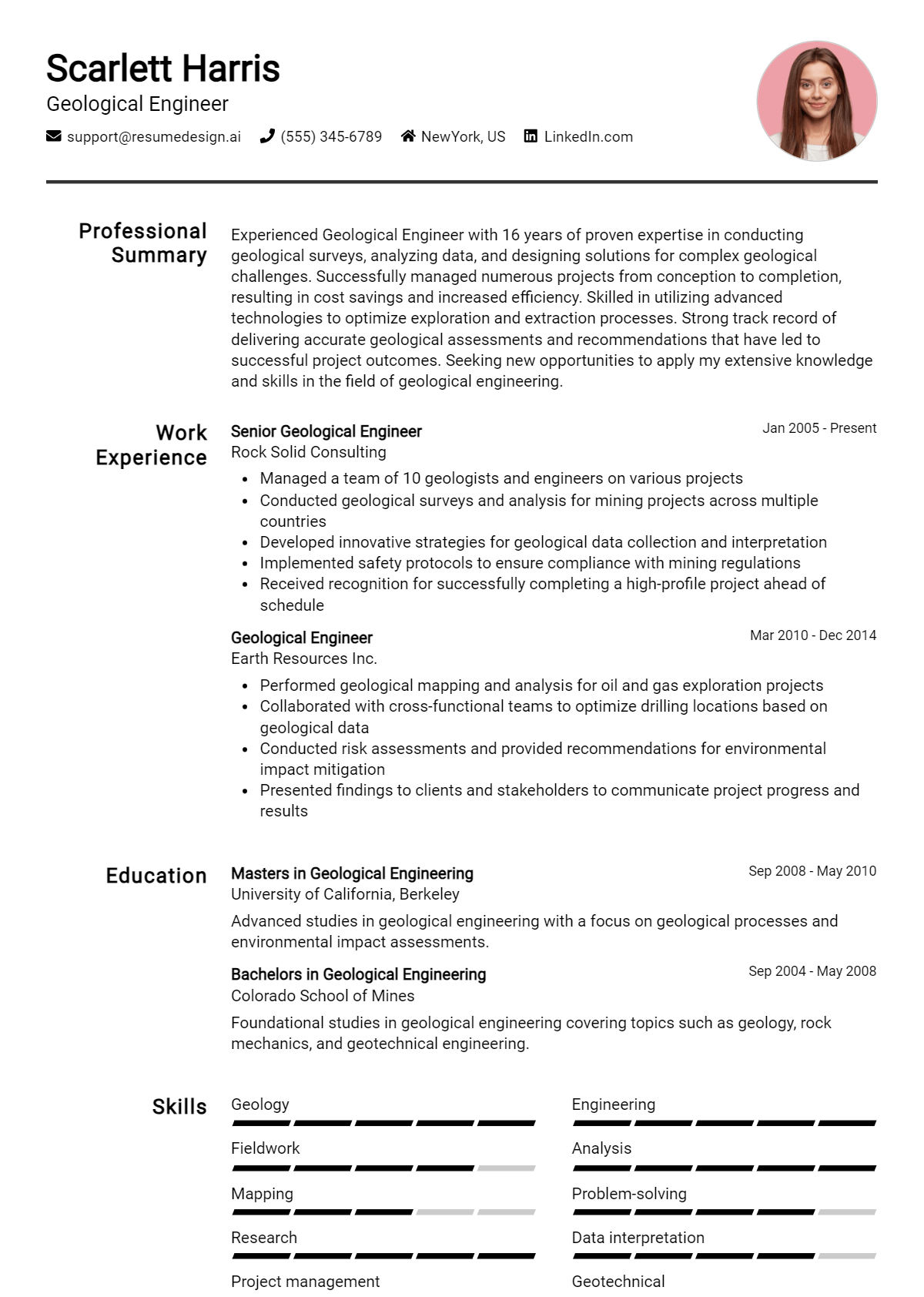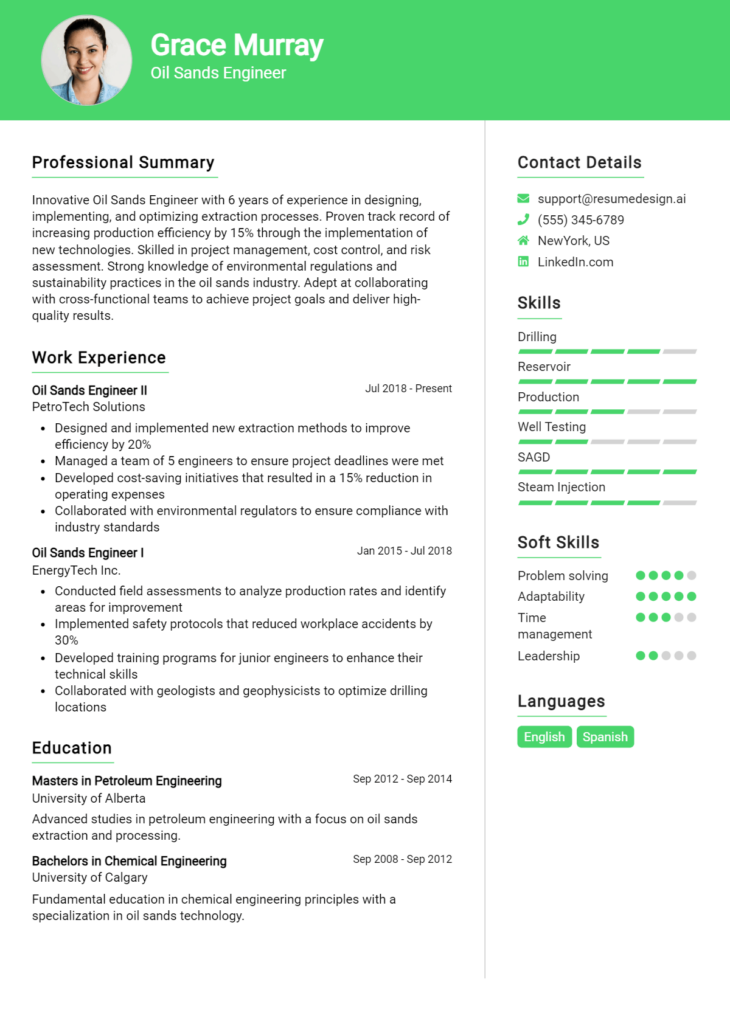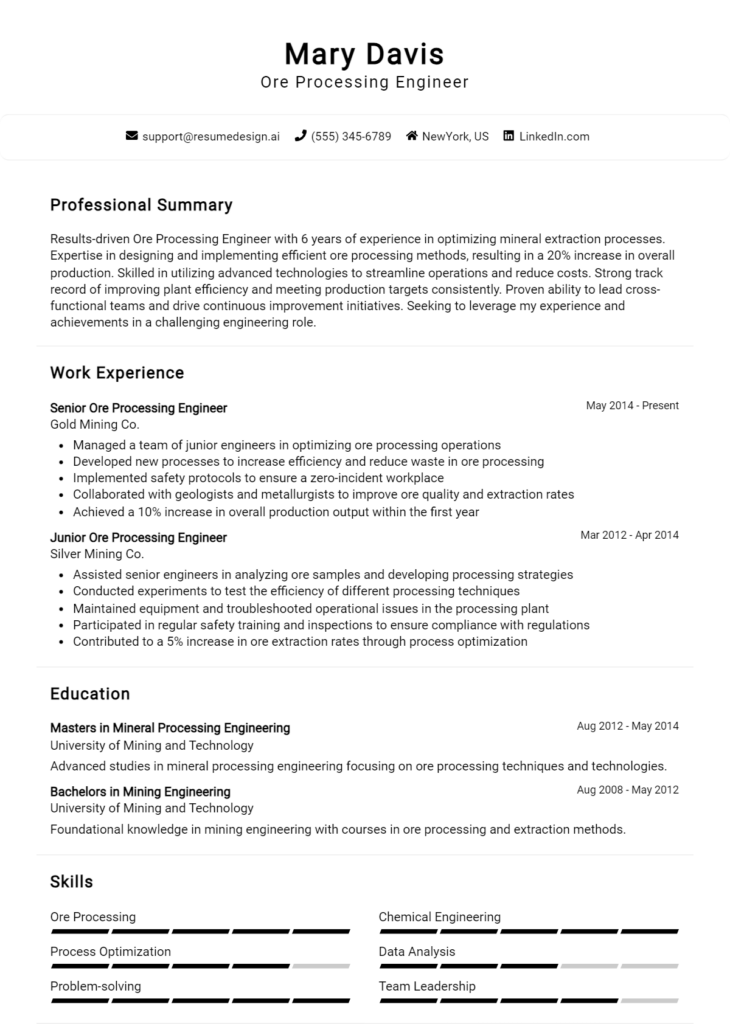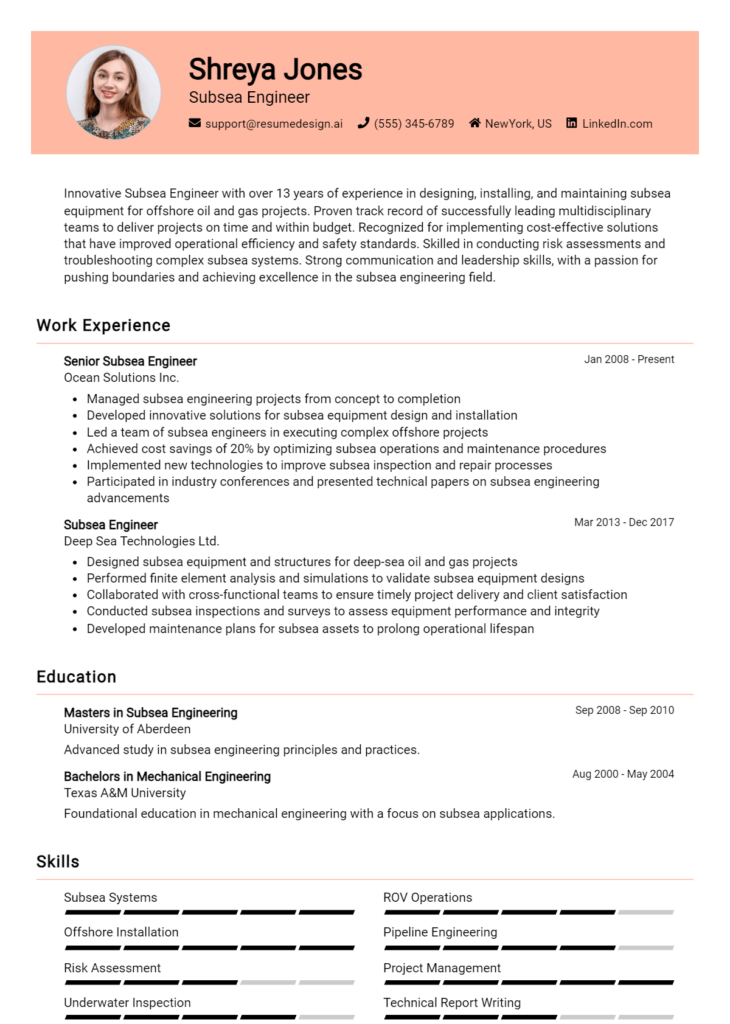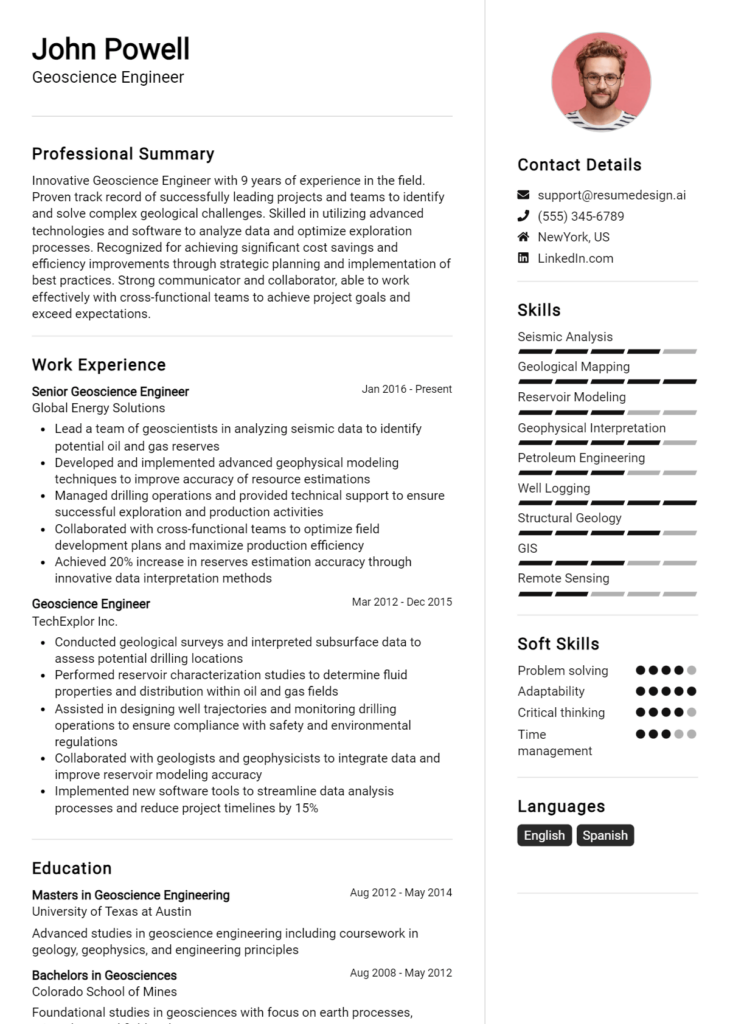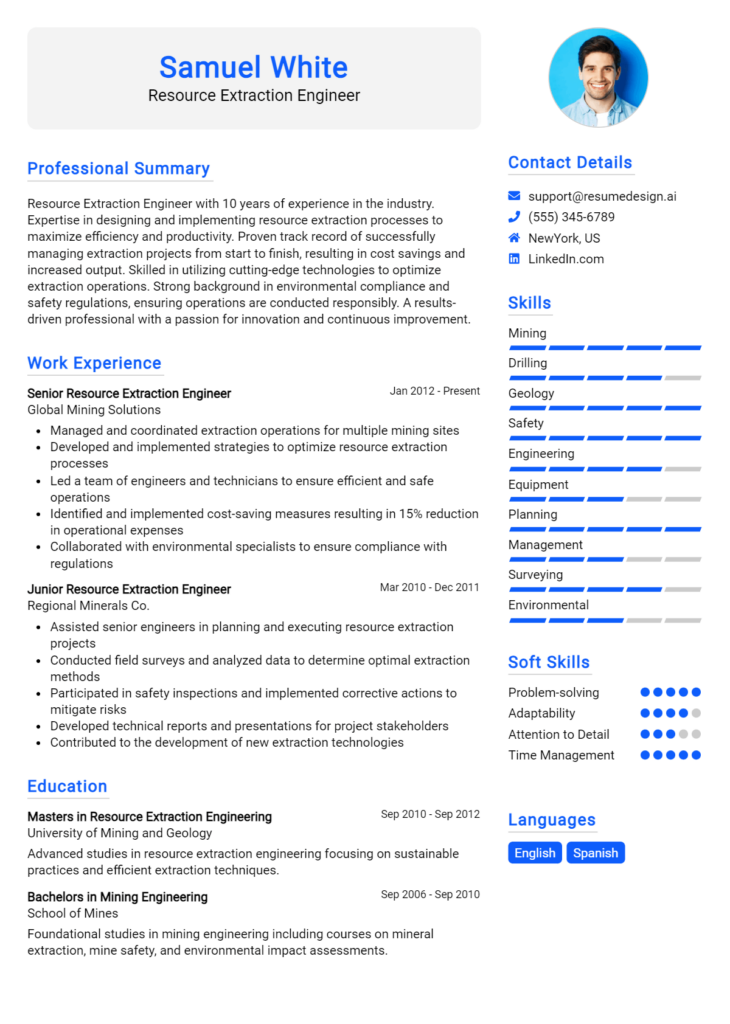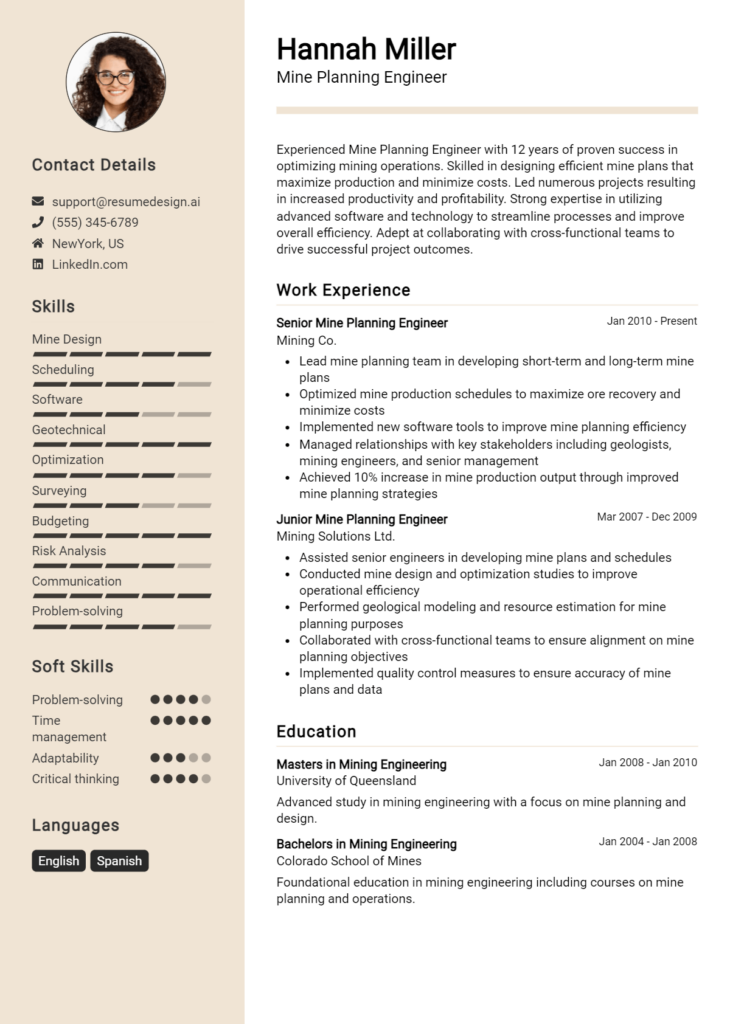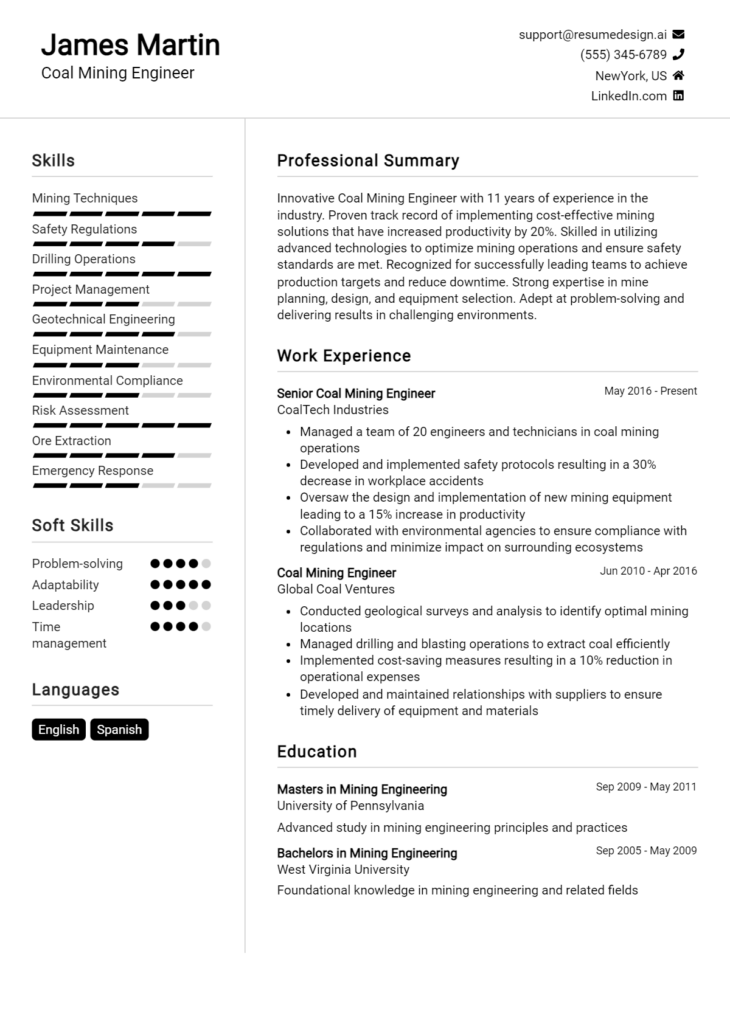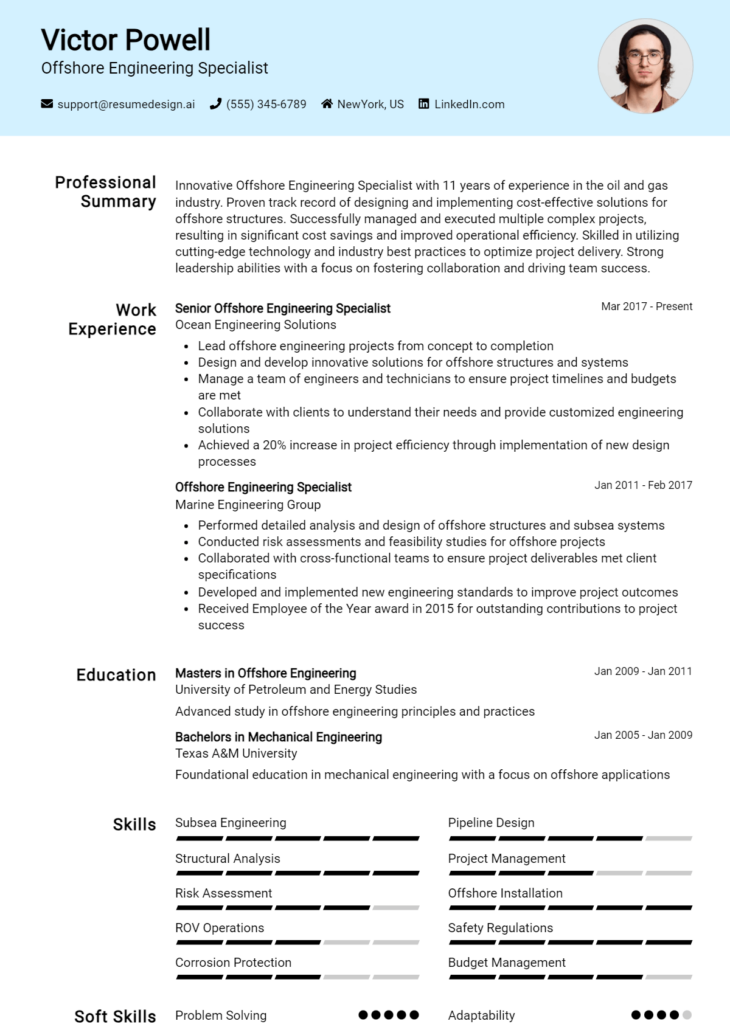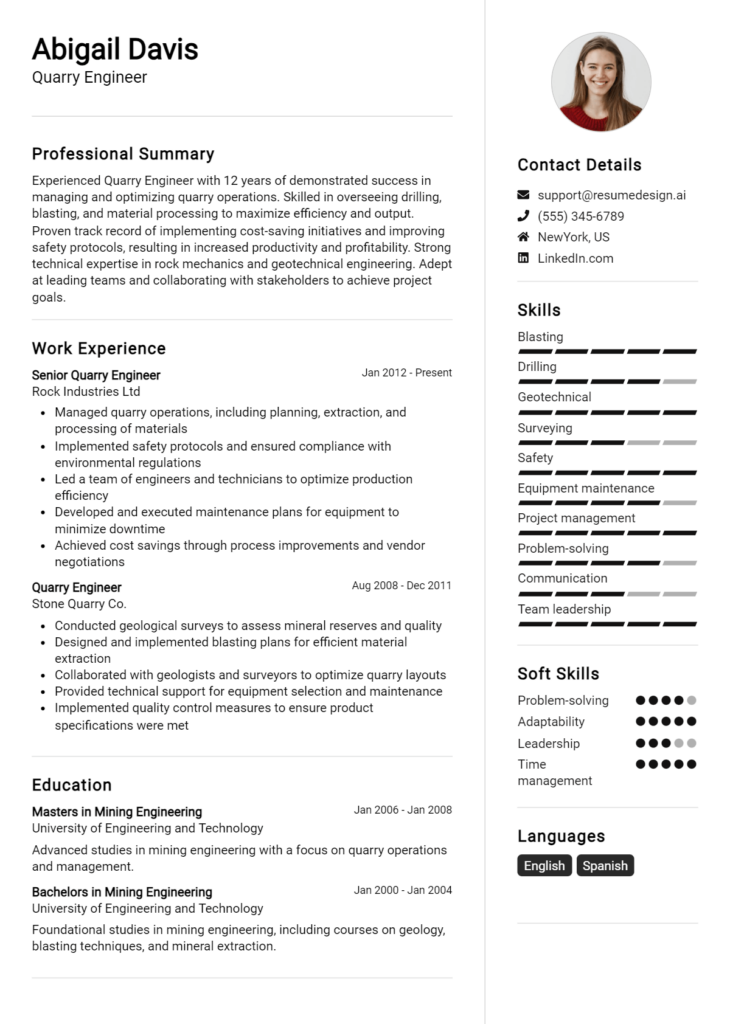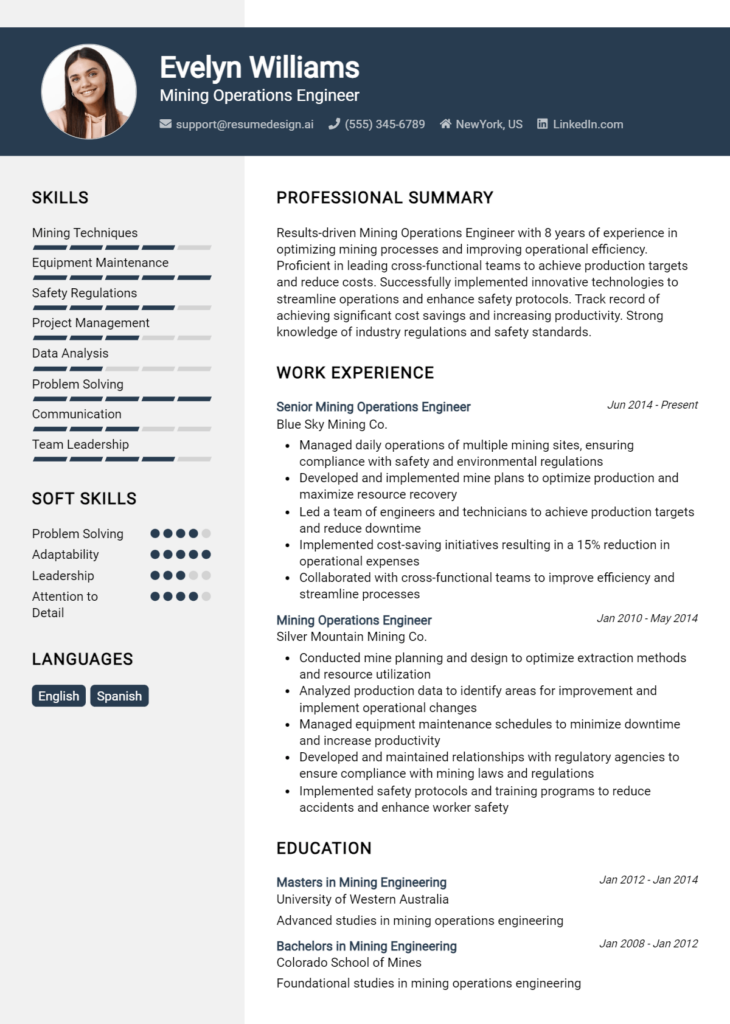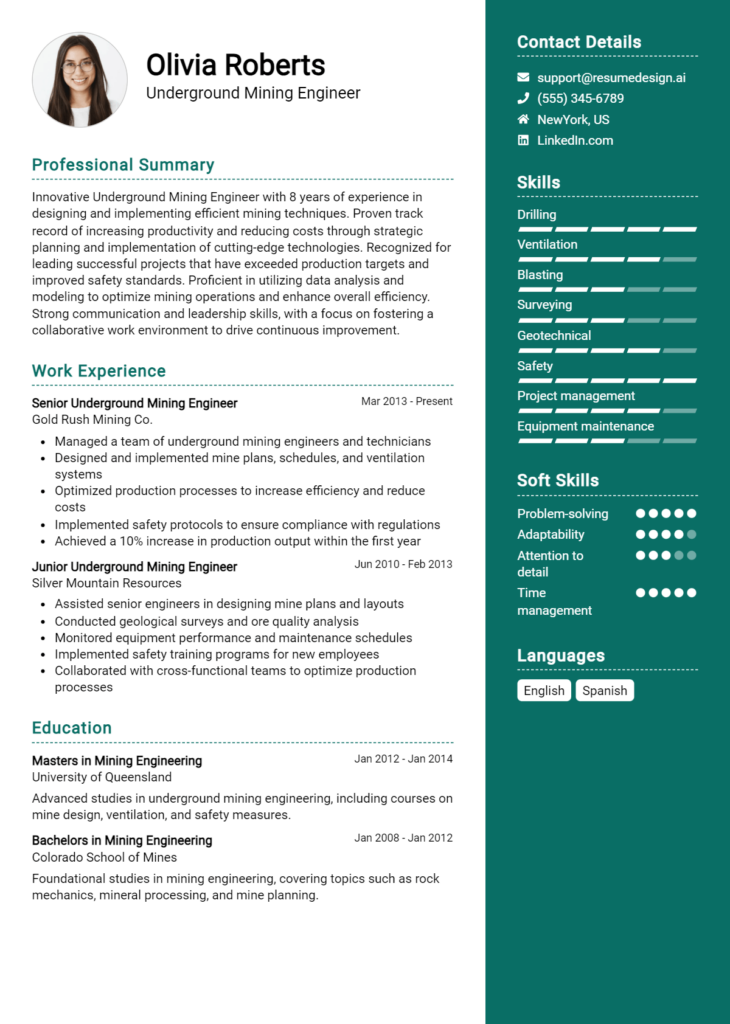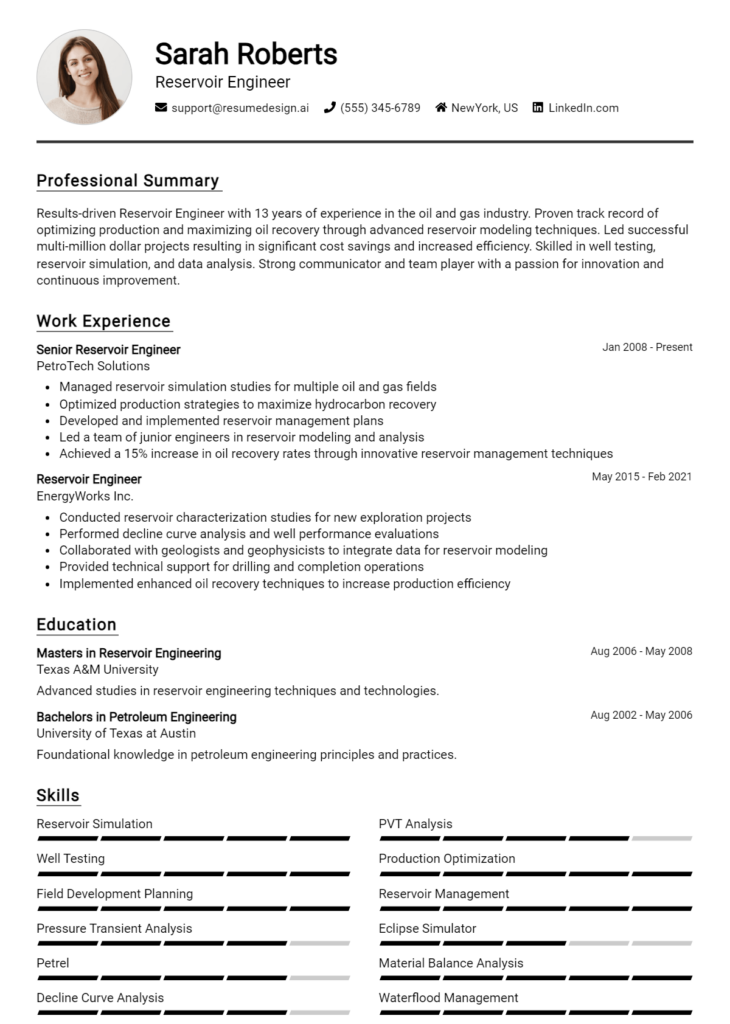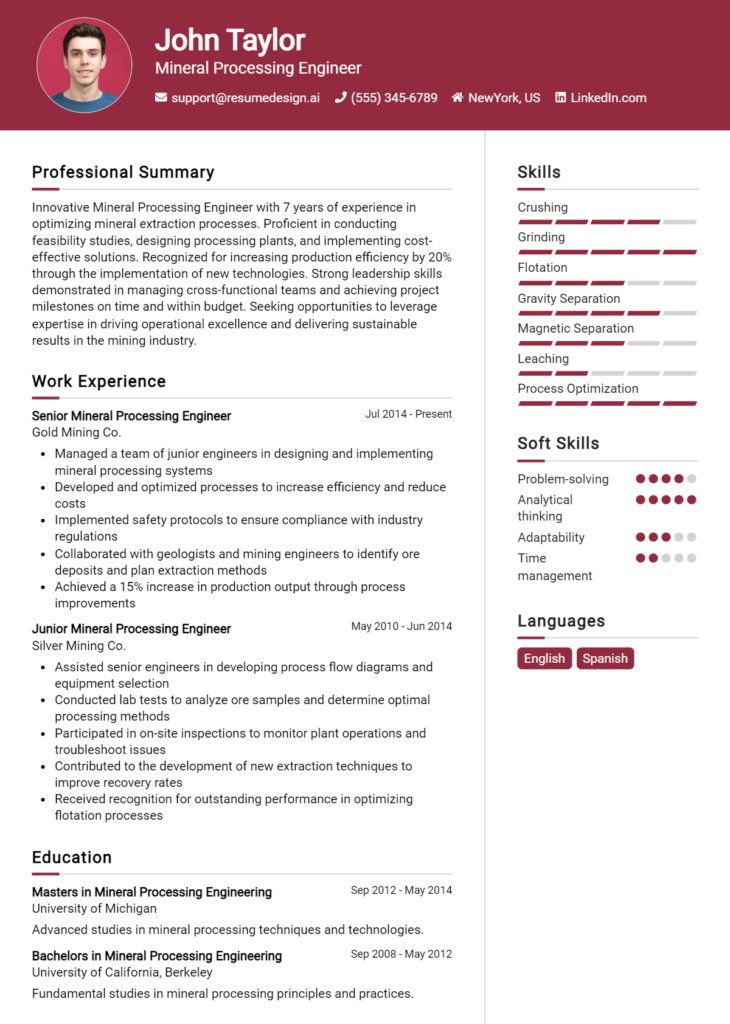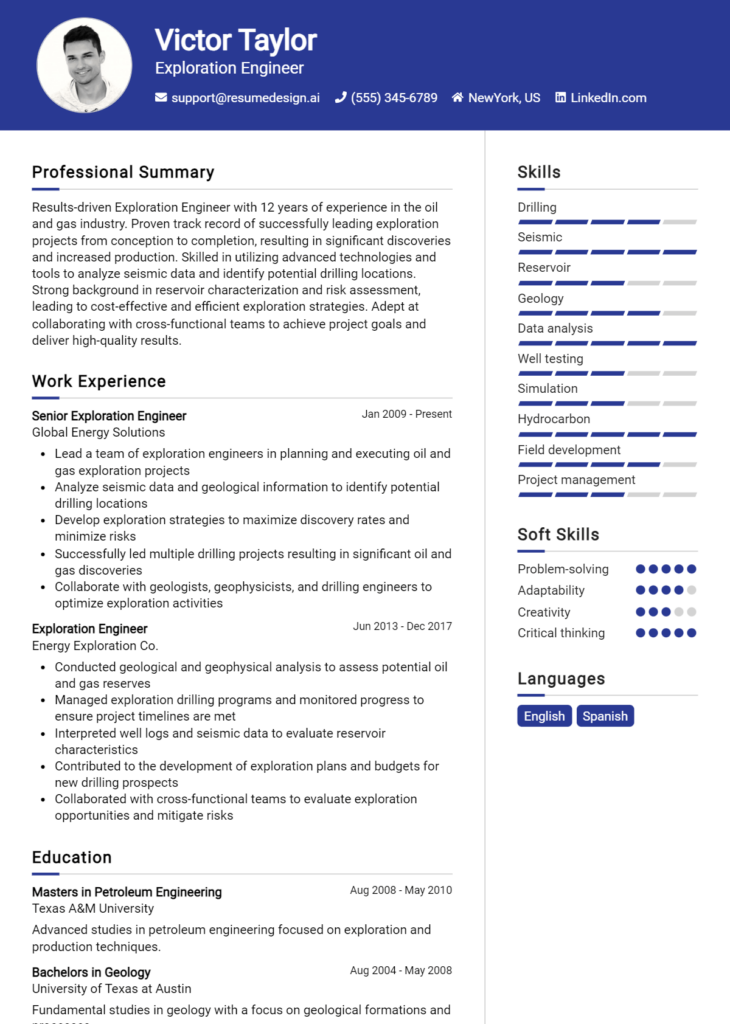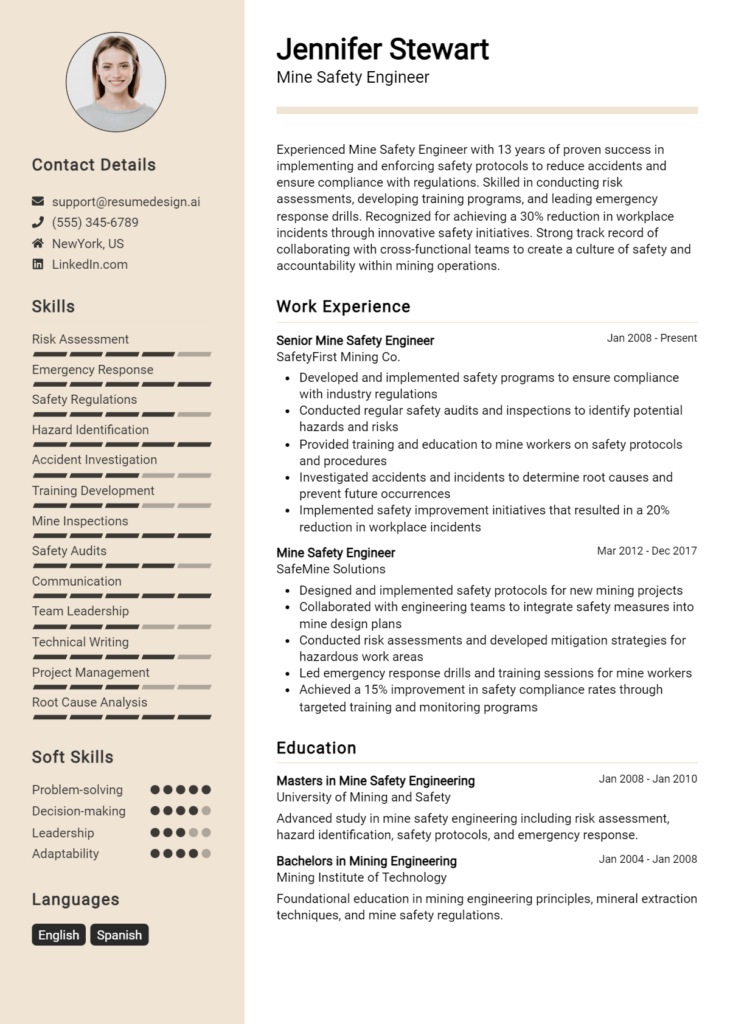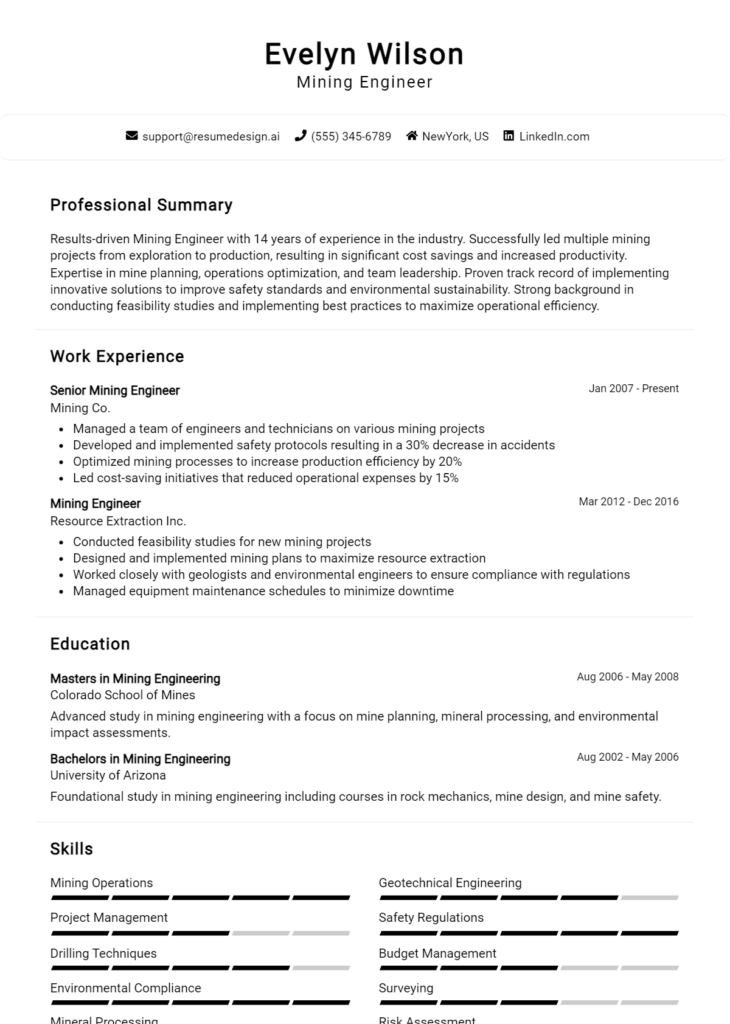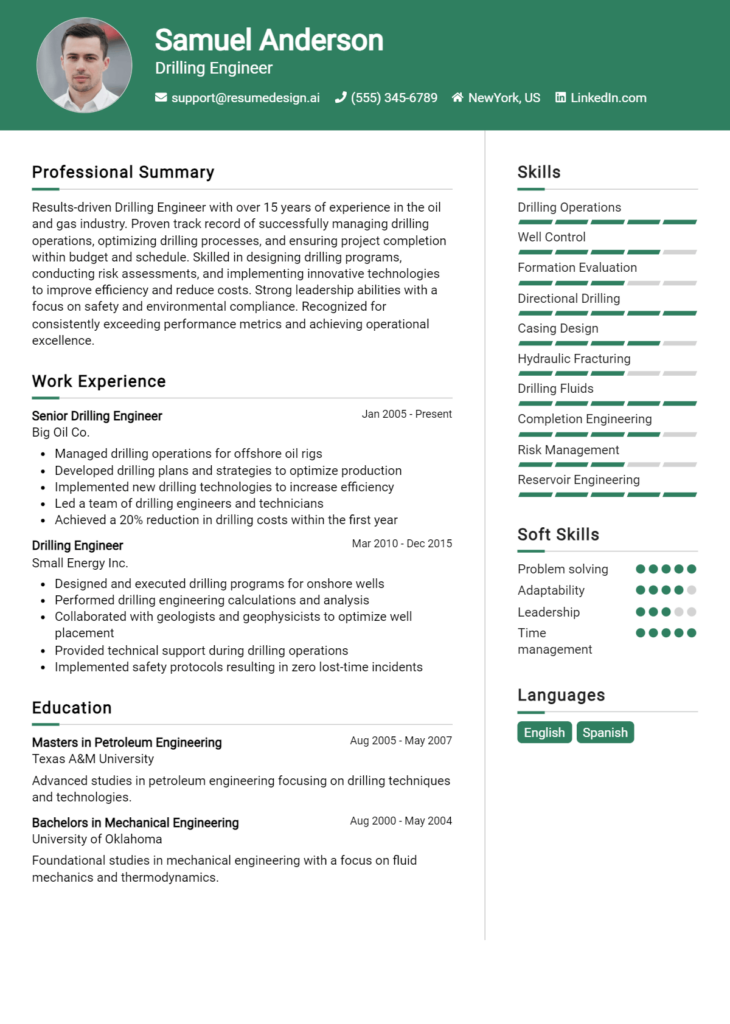Geological Engineer Core Responsibilities
A Geological Engineer plays a critical role in assessing geological conditions and resources, ensuring safe and sustainable development practices. This professional bridges various departments—such as environmental science, construction, and mining—by applying technical knowledge and operational expertise. Essential skills include strong analytical abilities, problem-solving capabilities, and proficiency in geological software. These competencies contribute significantly to organizational goals, and a well-structured resume can effectively highlight these qualifications, demonstrating the candidate’s readiness to tackle complex engineering challenges.
Common Responsibilities Listed on Geological Engineer Resume
- Conduct geological surveys and assessments to evaluate site conditions.
- Analyze geological data and prepare detailed reports.
- Collaborate with multidisciplinary teams to design and implement projects.
- Evaluate environmental impact and ensure compliance with regulations.
- Utilize geotechnical engineering principles in project development.
- Develop and manage drilling programs for resource extraction.
- Perform risk assessments related to geological hazards.
- Provide technical support during construction and excavation processes.
- Monitor and analyze subsurface conditions throughout project lifecycle.
- Prepare and present findings to stakeholders and regulatory bodies.
High-Level Resume Tips for Geological Engineer Professionals
For Geological Engineer professionals, a well-crafted resume is not just a document; it is a crucial marketing tool that can significantly impact career opportunities. As the first impression a candidate makes on potential employers, a resume must effectively showcase both skills and achievements relevant to the field. In a competitive job market, it’s essential for Geological Engineers to present their unique qualifications in a clear and compelling manner. This guide will offer practical and actionable resume tips specifically tailored for Geological Engineer professionals, ensuring that your application stands out to hiring managers.
Top Resume Tips for Geological Engineer Professionals
- Tailor your resume to the specific job description by using keywords and phrases from the posting.
- Highlight your relevant experience, including internships, projects, and fieldwork that align with the job you are applying for.
- Quantify your achievements by using numbers, percentages, or specific outcomes to demonstrate your impact in previous roles.
- Include industry-specific skills such as geological modeling, data analysis, and familiarity with geotechnical software.
- Showcase your educational background prominently, especially if you have advanced degrees or certifications relevant to geological engineering.
- Incorporate any relevant publications, presentations, or professional affiliations that demonstrate your engagement in the field.
- Use a clean, professional format that is easy to read, ensuring that important information stands out.
- Keep your resume concise, ideally one page, unless you have extensive experience that justifies a longer format.
- Include a strong summary statement at the top, capturing your key qualifications and career objectives in geological engineering.
By implementing these tips, Geological Engineer professionals can significantly increase their chances of landing a job in the field. A well-organized and targeted resume not only highlights your qualifications but also demonstrates your commitment to the profession, making you a more attractive candidate to potential employers.
Why Resume Headlines & Titles are Important for Geological Engineer
In the competitive field of geological engineering, a well-crafted resume headline or title is essential for making a strong first impression on hiring managers. A powerful headline can immediately grab attention, summarizing a candidate's key qualifications and expertise in a concise and impactful phrase. This critical element serves as a snapshot of the applicant's professional identity, allowing employers to quickly gauge relevance to the position being applied for. When tailored effectively, resume headlines can set the tone for the entire application, demonstrating both professionalism and an understanding of the specific job requirements.
Best Practices for Crafting Resume Headlines for Geological Engineer
- Keep it concise: Aim for a headline that is clear and to the point, ideally one sentence or less.
- Be role-specific: Tailor the headline to reflect the specific position of geological engineer you are applying for.
- Highlight key qualifications: Focus on skills, certifications, or experiences that make you a strong candidate.
- Use impactful language: Choose words that convey confidence and expertise, avoiding vague terms.
- Incorporate relevant keywords: Use industry-specific terms that reflect your knowledge and align with the job description.
- Showcase accomplishments: If applicable, include notable achievements that demonstrate your value to potential employers.
- Avoid clichés: Steer clear of overused phrases that may diminish the uniqueness of your application.
- Consider your audience: Think about what hiring managers in the geological engineering field are looking for and tailor your headline accordingly.
Example Resume Headlines for Geological Engineer
Strong Resume Headlines
"Experienced Geological Engineer Specializing in Sustainable Resource Management"
“Project Manager with 10+ Years in Geotechnical Investigations and Environmental Assessments”
“Certified Geological Engineer with Proven Track Record in Mining Engineering Projects”
Weak Resume Headlines
“Geological Engineer Looking for Opportunities”
“Hardworking Professional in Engineering Field”
The strong headlines are effective because they clearly communicate the candidate's specific expertise, relevant experience, and professional achievements, making them stand out to hiring managers. In contrast, the weak headlines lack specificity and fail to convey any unique value, rendering them forgettable and less impactful. A compelling headline not only captures attention but also sets the stage for a deeper exploration of the candidate's qualifications within the resume.
Writing an Exceptional Geological Engineer Resume Summary
A resume summary is a critical component of a Geological Engineer's job application, serving as the first impression potential employers have of a candidate. A well-crafted summary instantly captures the attention of hiring managers by succinctly highlighting key skills, relevant experience, and notable accomplishments that align with the job requirements. It should be concise, impactful, and specifically tailored to the position being applied for, ensuring that the candidate stands out in a competitive field. An effective resume summary not only showcases the candidate’s qualifications but also sets the tone for the rest of the resume.
Best Practices for Writing a Geological Engineer Resume Summary
- Quantify Achievements: Use numbers and specific metrics to demonstrate your impact and contributions.
- Focus on Relevant Skills: Highlight technical skills and competencies that are directly applicable to the role.
- Tailor to the Job Description: Customize your summary to reflect the specific requirements and responsibilities outlined in the job posting.
- Keep it Concise: Aim for 3-5 sentences that clearly communicate your qualifications without unnecessary jargon.
- Use Action Verbs: Start sentences with strong action verbs to convey confidence and proactivity.
- Highlight Industry Knowledge: Emphasize your understanding of geological principles and engineering practices relevant to the industry.
- Showcase Soft Skills: Include interpersonal skills like teamwork and communication that complement your technical abilities.
- Update Regularly: Revise your summary regularly to reflect new achievements, skills, and experiences.
Example Geological Engineer Resume Summaries
Strong Resume Summaries
Results-driven Geological Engineer with over 8 years of experience in mineral exploration and site assessment. Led a team that successfully identified and developed a gold deposit, increasing production by 25% within the first year. Proficient in utilizing advanced geological modeling software and conducting risk assessments to ensure project viability.
Detail-oriented Geological Engineer with a strong background in geotechnical investigations and environmental compliance. Managed over 15 complex projects, improving site safety protocols which reduced incidents by 30%. Skilled in data analysis and reporting, with a proven track record of delivering projects on time and within budget.
Dynamic Geological Engineer with 10+ years of experience specializing in resource management and sustainable development. Instrumental in developing a new drilling strategy that decreased costs by 20% while increasing efficiency. Excellent communicator with a knack for collaborating with cross-functional teams.
Weak Resume Summaries
Geological Engineer with some experience looking for new opportunities. I have worked on various projects and have a general understanding of geology.
Dedicated professional seeking a position as a Geological Engineer. I have skills in engineering and geology and am eager to learn more.
The strong resume summaries effectively demonstrate the candidates’ qualifications by quantifying achievements, showcasing relevant skills, and tying their experiences directly to the job role. In contrast, the weak summaries lack specificity and measurable outcomes, making them appear generic and less compelling. This highlights the importance of crafting a targeted and impactful summary to capture the interest of hiring managers.
Work Experience Section for Geological Engineer Resume
The work experience section of a Geological Engineer resume is pivotal in demonstrating a candidate’s technical skills and professional journey. This section serves as a platform to highlight relevant experiences that not only showcase the engineer's expertise in geological analysis, project management, and environmental compliance but also their ability to lead teams and deliver high-quality results. By quantifying achievements—such as the successful completion of projects under budget or ahead of schedule—and aligning experiences with industry standards, candidates can effectively illustrate their value to potential employers.
Best Practices for Geological Engineer Work Experience
- Use specific, action-oriented language to describe your role and contributions.
- Quantify your achievements with metrics (e.g., cost savings, project timelines, etc.).
- Highlight technical skills relevant to geological engineering, such as software proficiency or fieldwork techniques.
- Showcase leadership and teamwork experiences, emphasizing your role in collaborative projects.
- Align your experiences with industry standards and expectations to demonstrate relevance.
- Tailor your work experience descriptions to the job you are applying for, focusing on the most pertinent information.
- Include any certifications or specialized training that enhance your qualifications.
- Use bullet points for clarity and to improve readability, making it easy for hiring managers to skim through your experience.
Example Work Experiences for Geological Engineer
Strong Experiences
- Led a team of 5 engineers in a $2 million geological survey project that resulted in a 30% reduction in operational costs through optimized resource allocation.
- Designed and implemented a new data analysis method that improved the accuracy of geological modeling by 25%, enhancing project outcomes for clients.
- Collaborated with environmental scientists to assess the impact of mining activities, leading to the development of a sustainable resource management plan adopted by local authorities.
- Managed a cross-functional team during a critical phase of a large-scale drilling project, ensuring completion two weeks ahead of schedule while maintaining safety standards.
Weak Experiences
- Worked on geological projects.
- Participated in team meetings and discussions.
- Helped with various tasks in the field.
- Assisted in data collection and analysis.
The examples of strong experiences are considered effective because they provide specific outcomes, highlight leadership, and demonstrate collaboration in a meaningful way. Each bullet point quantifies achievements and communicates the candidate's value in a clear and compelling manner. In contrast, the weak experiences are vague and lack detail, failing to convey the candidate's contributions or the significance of their role, which diminishes their impact on potential employers.
Education and Certifications Section for Geological Engineer Resume
The education and certifications section of a Geological Engineer resume is crucial in showcasing a candidate’s academic qualifications, specialized training, and commitment to continuous professional development. This section serves to highlight not only the foundational knowledge acquired through formal education but also the industry-relevant certifications that demonstrate expertise and proficiency in geological engineering principles. By including relevant coursework and specialized training, candidates can significantly enhance their credibility and showcase their alignment with the specific requirements of the job role, making them more appealing to potential employers.
Best Practices for Geological Engineer Education and Certifications
- Include degrees from accredited institutions relevant to geological engineering, such as Geology, Geological Engineering, or Environmental Engineering.
- List certifications that are recognized in the industry, such as Professional Engineer (PE) or Certified Engineering Geologist (CEG).
- Highlight relevant coursework that pertains to geological practices, engineering principles, or environmental science.
- Provide details about specialized training, workshops, or seminars attended that enhance practical skills.
- Organize the information in reverse chronological order, starting with the most recent qualifications.
- Use clear and concise language to describe qualifications and avoid jargon that may not be understood by all employers.
- Tailor the education and certifications section to match the job description and requirements for the position being applied for.
- Ensure that all information is accurate and up-to-date, reflecting the most current qualifications and achievements.
Example Education and Certifications for Geological Engineer
Strong Examples
- Bachelor of Science in Geological Engineering, University of XYZ, Graduated May 2022
- Professional Engineer (PE) Certification, State Board of Professional Engineers, Obtained June 2023
- Master’s Coursework in Environmental Geology, University of ABC, Completed 2023
- Certified Engineering Geologist (CEG), National Association of State Boards of Geology, Certified January 2024
Weak Examples
- Bachelor of Arts in History, University of DEF, Graduated May 2020
- Certification in Basic Computer Skills, Online Course, Completed 2021
- High School Diploma, ABC High School, Graduated June 2018
- Outdated Certification in Environmental Impact Assessment, Expired 2020
The strong examples are considered effective because they directly relate to the field of geological engineering, showcasing relevant degrees, certifications, and coursework that demonstrate a solid foundation in the discipline. In contrast, the weak examples lack relevance to geological engineering, featuring degrees and certifications that do not contribute to the candidate's qualifications for the role. This distinction highlights the importance of aligning educational background and certifications with industry standards and job requirements.
Top Skills & Keywords for Geological Engineer Resume
In the competitive field of geological engineering, showcasing the right skills on your resume is crucial for standing out to potential employers. Employers seek candidates who not only possess technical expertise but also demonstrate strong interpersonal qualities. A well-rounded resume that highlights both hard and soft skills can effectively communicate your qualifications and suitability for the role. By strategically incorporating keywords relevant to geological engineering, you can enhance your visibility and increase your chances of landing interviews. To help you craft an impressive resume, let’s explore the essential skills you should consider including.
Top Hard & Soft Skills for Geological Engineer
Hard Skills
- Geological mapping
- Soil and rock mechanics
- Geophysical methods
- Hydrology and groundwater modeling
- Environmental impact assessments
- Site investigation techniques
- Geotechnical analysis
- Computer-aided design (CAD) software
- Data analysis and interpretation
- Mineral exploration techniques
- Remote sensing technologies
- Geographic Information Systems (GIS)
- Project management
- Laboratory testing and analysis
- Technical report writing
- Risk assessment and management
- Regulations and compliance knowledge
Soft Skills
- Problem-solving abilities
- Strong communication skills
- Team collaboration
- Attention to detail
- Critical thinking
- Project management skills
- Adaptability and flexibility
- Leadership qualities
- Time management
- Conflict resolution
- Creative thinking
- Interpersonal skills
- Initiative and self-motivation
- Decision-making capabilities
- Networking skills
- Cultural sensitivity
- Customer service orientation
Including these skills on your geological engineer resume can significantly enhance its effectiveness. Additionally, remember to back these skills up with relevant work experience that illustrates your expertise and accomplishments in the field.
Stand Out with a Winning Geological Engineer Cover Letter
Dear [Hiring Manager's Name],
I am writing to express my interest in the Geological Engineer position at [Company Name], as advertised on [where you found the job listing]. With a Bachelor's degree in Geological Engineering from [Your University] and over [X years] of hands-on experience in geological assessments, site investigations, and resource management, I am excited about the opportunity to contribute to your esteemed team. My background in both fieldwork and computational modeling equips me with the skills necessary to tackle the complex challenges faced in geological engineering projects.
In my previous role at [Your Previous Company], I successfully led a team in conducting geotechnical investigations for a large-scale construction project, which involved analyzing soil and rock mechanics to ensure structural integrity. My expertise in using advanced geospatial technologies and software like GIS and AutoCAD allowed us to deliver precise and efficient solutions, ultimately reducing project costs by [specific percentage] while maintaining high safety standards. I thrive in collaborative environments, and I believe that my ability to communicate complex geological concepts to clients and stakeholders will enhance project outcomes at [Company Name].
I am particularly drawn to [Company Name] because of your commitment to sustainable practices and innovation in geological engineering. I am eager to contribute my skills in environmental assessments and resource management to help your team achieve its goals. I am confident that my proactive approach and dedication to continuous learning will make me a valuable asset to your organization.
Thank you for considering my application. I look forward to the opportunity to discuss how my background, skills, and enthusiasms align with the needs of your team. I am excited about the possibility of contributing to [Company Name] and am available at your earliest convenience for an interview.
Sincerely,
[Your Name]
[Your Phone Number]
[Your Email Address]
Common Mistakes to Avoid in a Geological Engineer Resume
When crafting a resume for a Geological Engineer position, it's essential to present your qualifications and experiences effectively. However, many candidates make common mistakes that can hinder their chances of landing an interview. Avoiding these pitfalls can help you create a compelling resume that highlights your skills and expertise in the field. Here are some frequent errors to steer clear of:
Generic Objective Statement: Using a vague objective fails to show your specific interest in the position and can make your resume blend in rather than stand out.
Neglecting Relevant Skills: Focusing too much on general skills rather than emphasizing technical competencies specific to geological engineering can diminish your appeal to employers.
Ignoring Keywords: Many companies use applicant tracking systems (ATS) to screen resumes. Failing to include relevant keywords from the job description may result in your resume being overlooked.
Overloading with Technical Jargon: While it's important to demonstrate expertise, using excessive technical terminology can confuse hiring managers who may not be specialists in geology.
Lack of Quantifiable Achievements: Merely stating responsibilities without quantifiable results can make your contributions seem less impactful. Use metrics to showcase your achievements.
Poor Formatting: A cluttered or overly complex layout can make it difficult for employers to read your resume. Aim for clarity and organization to enhance readability.
Excessive Length: A resume that is too lengthy can deter hiring managers. Stick to one or two pages and prioritize the most relevant information.
Omitting Continuing Education: Failing to mention relevant certifications, courses, or workshops can make it seem like you are not committed to professional development in the geological field.
Conclusion
As we conclude our exploration of the Geological Engineer role, it's essential to highlight the multifaceted nature of this profession. Geological Engineers play a critical role in assessing and managing natural resources, ensuring environmental sustainability, and mitigating geological hazards. Their expertise in geology, engineering principles, and environmental science equips them to tackle complex challenges in various industries, including construction, mining, and energy.
In today's competitive job market, having a standout resume is crucial for attracting potential employers. It should effectively showcase your skills, experiences, and qualifications tailored to the unique demands of the Geological Engineer role.
We encourage you to take a moment to review your Geological Engineer resume and ensure it aligns with current industry standards. To assist you in this process, a range of tools is available to help you craft the perfect resume. You can explore resume templates for inspiration, utilize a resume builder for a streamlined creation process, and check out resume examples that highlight effective formats and content. Additionally, consider enhancing your application with a professional cover letter template to make a great first impression.
Take action today—revamp your resume and position yourself for success in your career as a Geological Engineer!

